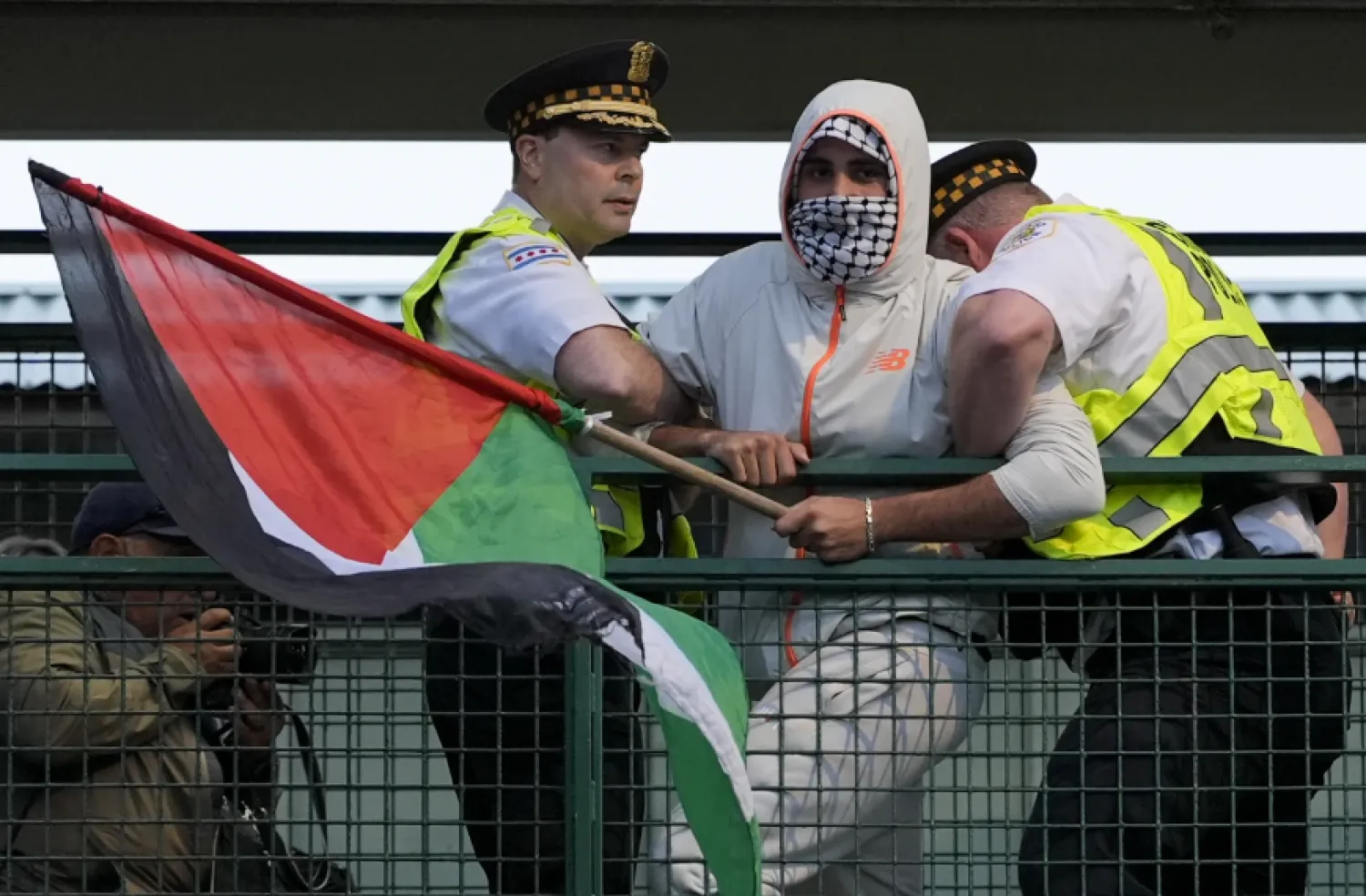More than 2,000 pro-Palestinian protesters marched Wednesday past a park where pro-Israel demonstrators had gathered earlier and toward the arena hosting the third night of the Democratic National Convention.
The demonstration, which stayed largely peaceful, came a day after violent clashes between police and protesters led to 56 arrests at a much smaller unsanctioned protest outside the Israeli Consulate.
Organizers of Wednesday's demonstration drew on the Chicago area's Palestinian community, one of the largest in the country, by bringing buses from suburban mosques.
Raed Shuk, 48, came with his children from the suburbs, including his 2-year-old son, who sat on Shuk’s shoulders ahead of the march. Shuk, whose parents are Palestinian, said they have come to so many rallies that his son knows the chants by heart.
“Everybody’s humanity needs to be equally addressed here and there,” The AP quoted him saying of Gaza. “I want to help my children learn from this experience that you always like to stand up for your rights and always peacefully protest.”
The march, one of the largest anticipated demonstrations of the week, took on a festive tone at times as a drum line led marchers and a sea of Palestinian flags waved above the crowds. Some kids ate popsicles as they walked, and others were pushed in strollers or rode in wagons.
The crowd stopped outside a park that is roughly a block from the United Center and used megaphones and air horns to call out elected leaders, including Illinois Gov. JB Pritzker, for being “complicit” in the war in Gaza. The two-term Democrat, who was under consideration as Vice President Kamala Harris’ running mate, criticized a ceasefire resolution Chicago approved in January.
As marchers passed under a new elevated train station near the United Center that was completed just before the DNC, officers were seen bringing a person to the ground on the platform above. In response, hundreds of protesters pushed against the edge of the station, banging on the glass with their hands and flag poles as they called on police to free the person. The person left through the station’s emergency exit moments later, accompanied by officers but not in handcuffs, prompting cheers from the crowd.
The crowds of pro-Palestinian protesters included many families and people of different faiths. Small groups of Muslims gathered in prayer at a park just ahead of the march’s kickoff, using keffiyeh as prayer rugs. Rabbis were among the leaders of the march, and a small group marched through in the crowd holding a sign that said “Christians for Ceasefire.”
Rabbi Brant Rosen, a founder of the Jewish Voice for Peace Rabbinical Council, condemned Democrats for not speaking out about the war in Gaza at the convention
“The word Palestine is not allowed inside the Democratic National Convention. The word ceasefire has barely been uttered,” he said. “This is a Hollywood-style coronation of a candidate. They assume they are entitled to our votes, but they are not entitled to our votes.”
Earlier in the day, police escorted pro-Israel demonstrators out of a park near the United Center as the area was blocked off ahead of the march of activists heading there.
The rally near the United Center was organized by the US Palestinian Community Network, a Palestinian and Arab community-based organization. It was in stark contrast to the protest Tuesday night outside the Israeli Consulate, where protesters not affiliated with a coalition of more than 200 groups that has the city's permission for demonstrations ended up in an intense standoff with Chicago police.
Chicago Police Superintendent Larry Snelling said those arrested Tuesday night outside the Israeli Consulate, about 2 miles (3.2 kilometers) from the United Center, “showed up with the intention of committing acts of violence, vandalism.” Snelling called police response “proportionate.”
Thirty of the people detained by police were issued citations for disorderly conduct, according to Chicago police. One person was arrested on a felony charge of resisting police, while nine were charged with misdemeanors including disorderly conduct, resisting officers, battery, assault and criminal damage to property, police said.
Snelling said that two people were taken to the hospital with minor injuries, one for knee pain and one with a finger injury. Two officers were injured but they refused medical attention because they did not want to leave fellow officers, Snelling said. He said three journalists were among those arrested, but he did not have details on charges.
Hatem Abudayyeh, co-founder of the US Palestinian Community Network, put the onus on police to keep the peace when asked about the clashes between pro-Palestinian protesters and police. The police “only have one responsibility here,” he said. “They have the responsibility of not infringing on our First Amendment rights.”
The Israeli Consulate has been the site of numerous demonstrations since the war in Gaza began in October, and protests during the DNC have largely focused on opposing the Israel-Hamas war..
The largest protest so far, which attracted about 3,500 people on Monday, was largely peaceful and resulted in 13 arrests, most related to a breach of security fencing. Two were arrested Sunday night during another mostly peaceful march.
Also on Wednesday, a man who escaped from a Mississippi courthouse and is wanted on murder and armed robbery charges was taken into custody following a standoff with police at a restaurant about half a mile from the United Center. There was no indication that he had any connection to the convention.









